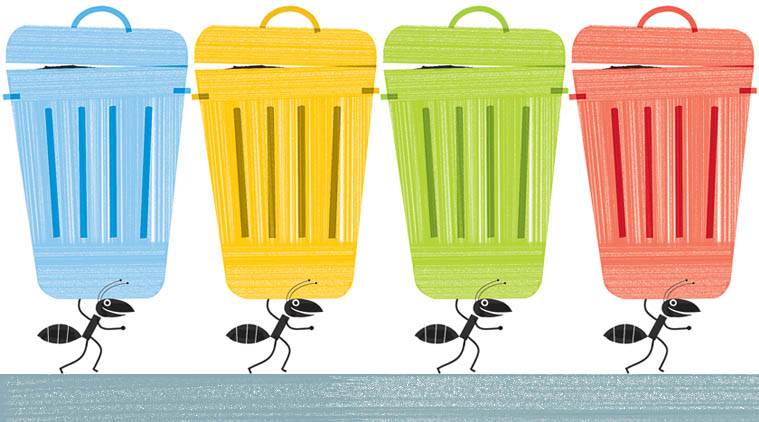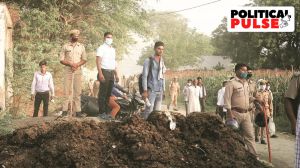- India
- International
Cities at crossroads: Small town, cleaner future
Big cities should learn how to implement waste separation effectively from small, mid-sized Indian cities.
 Big cities scoff at small towns leading the way and claim that their own waste volumes are unmanageable. (Illustration: CR Sasikumar)
Big cities scoff at small towns leading the way and claim that their own waste volumes are unmanageable. (Illustration: CR Sasikumar)
Cynics often point out that old habits die hard. They tell us that it is going to be impossible to get residents of Indian cities to keep different types of waste separate. Yet, we know this is essential for municipalities to find a sustainable solution to the problem of solid waste management.
But there is some good news. Small and mid-size cities and towns of India are showing the way on how to manage solid waste by getting communities to segregate waste and keeping the waste streams separate. In this column we share experience from our visits to some of these cities including, in particular, Suryapet and Karjat. Effective leadership in these cities and towns has found simple and sustainable solutions to the problems of solid waste management which still elude our metropolitan cities.
The earliest and the best success story was of Suryapet, a city in Telangana, located 136 km east of Hyderabad, with a population of a little over one lakh. In 2003-2004, there was no external funding, no NGO and no resident welfare associations. A single individual, S A Khadar, the commissioner of Suryapet municipal corporation, demonstrated personal leadership which made a big difference. He managed all of the Suryapet’s wet and dry waste (32 tonne daily at that time) on a half-acre site within the city, earning a gross income of Rs 1 lakh per month from vermi-composting and recycling. There was no need for a landfill. Khadar saheb began by winning the hearts of his sanitary workers by prompt satisfaction of minor demands, such as granting leave and/or reassignment of workplaces. Next he wooed the residents, one mohalla or street or commercial area at a time, by organising daily meetings on morning rounds from six to nine am before beginning his office work. Residential pockets that gave 100 per cent unmixed waste earned token gifts.
Even more impressive and crucial was the municipal corporation’s visible commitment to transporting segregated wastes for ease of separate processing. The commissioner got banks to fund new tractor-trailers (which can unload waste mechanically) for self-help groups by guaranteeing their monthly repayments to banks from the city payments to their SHGs for waste collection services. The tractors moved punctually and dependably along lanes, stopping at every six-seven houses to collect unmixed waste. The same teams swept the roads, so they had the incentive to do efficient collection without spillovers during the process of collection.
The tractor trailers first offloaded the wet waste which was stabilised for two weeks by stack-composting — composting in vertical heaps that require less space and are piled off the ground for natural air circulation, without manual turning. This was fed to vermi-beds where quality vermicompost was in good demand, earning the municipality Rs 45,000 per month.

The tractor trailers had high wire-mesh compartments for different categories of dry waste which was offloaded at the inner city sorting shed. Eight waste-pickers on city payroll further separated the wastes for daily sale. This is what normally happens informally at the rear of all waste-buyers premises. The sale of recyclables generated additional earnings of Rs 55,000 per month.
Open drain cleaning was done in the afternoons. Soggy silt went directly into a wheelie-bin and then into a dedicated leak-proof collection vehicle which unloaded the silt and the debris for widening the road shoulders of all radial roads.
The Suryapet experience clearly shows that citizens can be incentivised to give wet and dry wastes unmixed when they see clear administrative will and primary collection vehicles designed to accept and transport wastes unmixed. The universal complaint of city officials that residents do not cooperate is often an excuse for their own lack of will, vision and action.
A second inspiring example of what human leadership can do, is found in Karjat, a small town in Maharashtra with a population of close to 30,000. Ramdas Kokare was appointed commissioner of the municipal council of Karjat in end-2017, arriving with a fine reputation for making tiny Vengurla (population of 13,000 and floating tourists 5000) a dump-free town. Public expectations of him must have been high. Within two days of joining, Kokare strictly enforced Maharashtra’s ban on plastic carry bags. These are now replaced by sari-cloth bags which cost Rs 6 per bag. Handcart vendors use bags made out of newspapers. What is amazing is how he persuaded Karjat residents, already enjoying doorstep waste collection, to cooperate in giving 36 kinds of waste separately on different days of the week! This is probably a global first.
Many progressive cities abroad have different bins for wet-dry-garden waste and rejects, and separate days of the month or year to collect e-waste or discarded household furniture and appliances. But Karjat is the first town where we have seen regular weekly collection of so many separate items. Kokare must have intensely motivated and trained his waste collection staff to demand and sustain such achievement. The large shed at the former dump is now full of separate categories of waste regularly being purchased and removed.
The secret of the success of Kokare and Khadar, is passion and daily personal supervision, both going around the city every morning before office hours to meet, persuade and exhort citizens to cooperate. In Karjat, after initial warnings, doorstep collectors refuse to collect mixed waste and also report the person. The same evening, an official comes and grills the person on where they dumped their uncollected mixed waste. Such intense individual effort is especially required at the start. Once word gets around, cooperation is easier.
There are other cities with innovative approaches to solid waste management. In Namakkal (population of 55,000) in Tamil Nadu, pushcart collection workers have been manually separating mixed waste into wet and dry, daily at the doorstep of each household, rather than attempt behavior change. Years later, Raichur (2.3 lakh population), Warangal (6.15 lakh population), and Kolar (15.3 lakh population) have redesigned their pushcarts to enable them to carry half a dozen bags on the cart so that dry waste can be sorted then and there for easy sale without the need for a sorting centre. Alappuzha in Kerala was recently recognised by the United Nations Environment Program (UNEP) for its decentralised system of waste management. In these and many more small towns, the secret of success is meticulous micro-planning, committed leadership at the administrative level and receptive and engaged communities. The objective is clear — a litter-free, bin-free and dump-free city.
Big cities scoff at small towns leading the way and claim that their own waste volumes are unmanageable. But even in large metropolitan cities, populations of most wards are smaller than of these towns. Decentralisation and effective use of delegated power at the ward level are crucial if micro-planning and implementation is to work with cooperation from RWAs. Only then can we find collective solution to the challenges of solid waste management in our larger cities.
Ahluwalia is chairperson, ICRIER and former chairperson of the high-powered committee on urban infrastructure and services. Patel is member, Supreme Court committee on solid waste management
EXPRESS OPINION
More Explained
Apr 27: Latest News
- 01
- 02
- 03
- 04
- 05











































